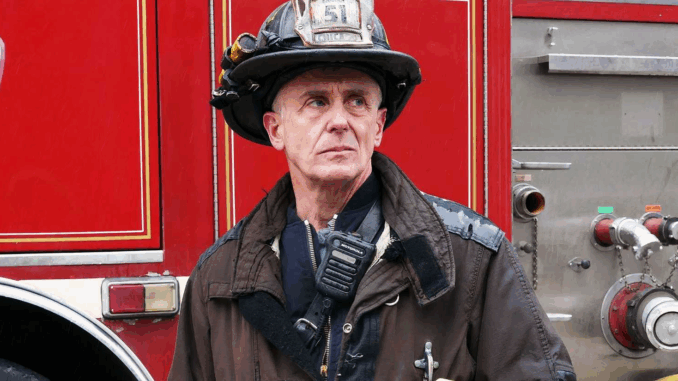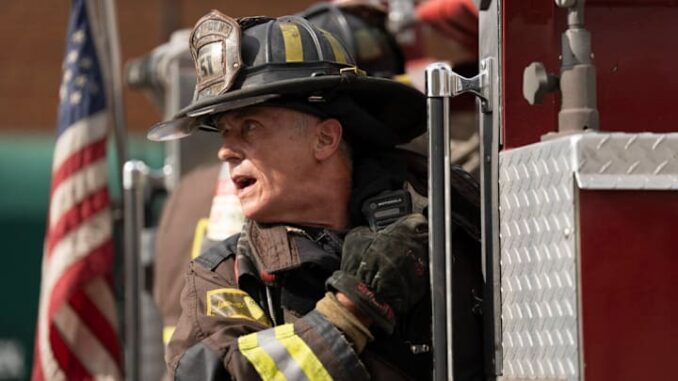
For more than a decade, Chicago Fire has defined courage through heartbreak, loyalty through loss, and brotherhood through the flames. But in Season 14’s October 22 episode, “Mercy,” the series delivered one of its most gut-wrenching blows yet — a story that pushed veteran firefighter Christopher Herrmann (David Eigenberg) to his emotional breaking point and reminded viewers why the show remains television’s most human drama.
A Morning of Peace Before the Storm
The episode opened with rare serenity at the Herrmann household.
Cindy (Robyn Coffin) bustled around the kitchen, corralling the couple’s five kids for school while Herrmann smiled proudly at their morning chaos — a man deeply rooted in his family’s everyday joys. One of his sons, beaming, marked another line on the family’s kitchen doorframe to record his growing height, teasing his brother about finally surpassing him. Herrmann kissed his wife goodbye, unaware that this would be the last morning he’d ever see that kitchen intact.
By the time he arrived at Firehouse 51, the day seemed ordinary — until fate intervened.
The Call That Shattered Everything
As Herrmann settled into the familiar rhythm of the firehouse, Mouch (Christian Stolte) picked up a call over the radio — a residential fire, roaring out of control. But the address froze the blood in everyone’s veins: it was Herrmann’s home.
Without hesitation, the firefighters of 51 leapt into action. The blaze wasn’t even in their district, but that didn’t matter — family was on the line. The engines tore across Chicago’s streets with urgency that pulsed through every frame.
When they arrived, they found Herrmann’s home swallowed by flames, a towering inferno consuming every memory, every keepsake, every trace of the life he’d built.
“It’s my house,” Herrmann whispered in disbelief, before rushing forward, desperate to fight back the fire himself. But the heat and chaos overwhelmed him. Even as orders screamed over the radio for him to retreat, Herrmann couldn’t let go — not of the home, not of the memories. He had to be dragged away as an explosion ripped through the house, sealing its fate.
When the smoke cleared, there was nothing left.
The Weight of Ashes
Later, Herrmann and Cindy stood before the ruins of their life, shell-shocked and silent. “It’s all gone,” he murmured, holding his wife as the camera lingered on their tears.
Back at Firehouse 51, his friends whispered about where the family would go, how they’d start again. Herrmann had moved into that home a decade ago — fans had watched him raise his children there, seen family dinners and birthday parties within those walls. Losing it wasn’t just a tragedy; it was the erasure of a history we’d all witnessed.
And yet, even as he grieved, Herrmann’s firefighter instincts couldn’t rest. How had the fire started? No one had been home. Could it have been electrical?
He turned to Lt. Kelly Severide (Taylor Kinney) — Firehouse 51’s resident arson expert — to uncover the truth.
The Search for Answers
Severide traced the fire’s origin to the kitchen — the symbolic heart of the Herrmann family. Herrmann hesitated as guilt crept in: he had recently rewired the stove himself. Could his handiwork have destroyed everything?
The idea haunted him. The guilt consumed him. When Severide confirmed that faulty wiring could have triggered the blaze, Herrmann’s self-blame erupted into rage and sorrow.
But after meticulous investigation, Severide discovered the true cause — a short in the ignition unit, not Herrmann’s rewiring. The firefighter was innocent. But the relief came too late to ease the pain.
Breaking Point
In a heartbreaking scene, Herrmann confided in Mouch about everything his family had lost — his daughter’s journals, his wife’s late mother’s ring, and the doorframe marked with their children’s growth. When Mouch tried to comfort him by reminding him they were just material things, Herrmann snapped.
“It’s not just stuff, Mouch. It’s our life. It’s everything.”
Overcome with grief, he withdrew from everyone — ignoring calls, isolating himself in his sorrow. Cindy, worried and desperate, reached out to Mouch for help.
The veteran firefighter knew exactly where to look. He found Herrmann kneeling in the ashes of his burned home, sifting through debris, searching for the doorframe — that last fragment of their past. But there was nothing left to find.
“You’re not to blame, Herrmann,” Mouch told him quietly, placing a hand on his shoulder as tears welled in Herrmann’s eyes.
A Ring, and a Promise
In the final moments, Herrmann returned to the temporary home Mouch had found for his displaced family. He apologized to Cindy for vanishing and confessed that he’d gone back to search for something — anything — to salvage.
Then, with trembling hands, he revealed what he and Mouch had managed to recover: her mother’s ring, miraculously pulled from the wreckage. Cindy broke down in tears, embracing him.
“We’ll rebuild,” she whispered. “Together.”
Herrmann nodded, his eyes glassy with both pain and hope.

The Fire Still Burns
“Mercy” isn’t just another disaster-of-the-week episode — it’s a masterclass in emotional storytelling. It reminds viewers that the bravest firefighters aren’t just the ones who run into burning buildings — they’re also the ones who face the flames of grief and find the courage to start again.
David Eigenberg delivers one of his most powerful performances in years, embodying a man stripped of everything yet still clinging to love, family, and duty.
As Chicago Fire enters its 14th season, Herrmann’s story proves that even when the house falls, the heart of Firehouse 51 still stands strong.
“Inferno of the Heart” will go down as one of Chicago Fire’s most emotionally charged episodes — a reminder that sometimes, the hardest fires to fight are the ones that burn within.